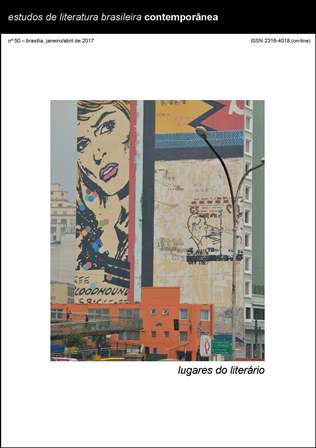Pater, pátria e a memória como patrimônio: sobre K.:
relato de uma busca, de Bernardo Kucinski
DOI:
https://doi.org/10.1590/2316-4018503Abstract
Existe uma memória de gênero? Existe uma memória masculina e/ou feminina? E o que acontece quando as memórias de um pai resgatam (ou tentam resgatar) a fragmentariedade das experiências da filha articuladas num tempo pessoal e subjetivo mas pontuadas pelos tempos traumáticos da História, ainda por mais da História da Pátria, da história-pátria? K.: relato de uma busca, de Bernando Kucinski, representa um dispositivo não só literário para tentar ensaiar algumas destas questões, como as da memória ou da pós-memória do supérstite, que são centrais no debate contemporâneo brasileiro.
Downloads
References
AGUIAR, Flávio (2011). O livro do Bernardo. Carta Maior, São Paulo, 28 out. On-line.
CATROGA, Fernando (2008). Pátria, Nação e Nacionalismo. In: TORGAL, Luís Reis; PIMENTA, Fernando Tavares; SOUSA, Julião Soares (Coord.). Comunidades imaginadas. Nação e nacionalismo em África. Coimbra: Imprensa da Universidade de Coimbra, p. 9-39.
ERTEL, Rachel (2001). Le yddish. La langue de la crypte. Les Temps Modernes, n. 615, p. 75-89.
ESPOSITO, Roberto (2006). Communitas. Origine e destino della Comunità . Torino: Einaudi.
HIRSCH, Marianne (2006). Immagini che sopravvivono: le fotografie dell’Olocausto e la post-memoria. In: CATTARUZZA, Marina et al. (Org.). Storia della Shoah. La crisi dell'Europa, lo sterminio degli ebrei e la memoria del XX secolo. Torino: UTET, v. 4, p. 385-431.
KUCINSKI, Bernardo (2011). K.: relato de uma busca. São Paulo: Estrela Polar.
MANACORDA, Júlia (2015). A negatividade a dar conta do real. Revista Contemporânea, Niterói, ano 5, v. 1, n. 7, p. 1-16.
OLIVEIRA, Tiago de (2013). Narrar o luto, resistir ao esquecimento. Revista Espaço Acadêmico, Maringá, v. 13, n. 151, p. 94-95.
RIBEIRO, Margarida Calafate; ROSSA, Walter (Org.) (2015). Patrimónios de influência portuguesa: modos de olhar. Coimbra: Imprensa da Universidade de Coimbra; Lisboa: Fundação Calouste Gulbenkian; Niterói: Editora da Universidade Federal Fluminense.
TRAVERSO, Enzo (2006). Comparare la Shoah: questioni aperte. In: CATTARUZZA, Marina et al. (Org.). Storia della Shoah. La crisi dell'Europa, lo sterminio degli ebrei e la memoria del XX secolo. Torino: UTET, v. 4, p. 167-199.
VECCHI, Roberto (2014). O passado subtraído da desaparição forçada: Araguaia como palimpsesto. Estudos de literatura brasileira contemporânea, Brasília, n. 43, p. 133-149.
WHITE, Hayden (2006). Forme di storia. Dalla realtà alla narrazione. Organização de E. Tortarolo. Roma: Carocci.
WEINRICH, Harald (2010). Lete: arte e critica dell’oblio. Tradução de F. Rigotti. Bologna: Il mulino. Ttítulo original: Lethe: Kunst und Kritik des Vergessens.
Downloads
Published
How to Cite
Issue
Section
License
Authors who publish in this journal agree to the following terms:
a) The authors maintain the copyright and grant the journal the right of first publication, the work being simultaneously licensed under the Creative Commons Attribution License-Non Commercial 4.0 which allows the sharing of the work with acknowledgment of the authorship of the work and publication this journal.
b) Authors are authorized to enter into additional contracts separately, for non-exclusive distribution of the version of the work published in this journal (eg publish in institutional repository or as a book chapter), with authorship recognition and publication in this journal.
c) Authors are allowed and encouraged to publish and distribute their work online (eg in institutional repositories or on their personal page) after the editorial process, as this can generate productive changes, as well as increase the impact and citation of published work (See The Effect of Free Access).
d) The authors of the approved works authorize the magazine to, after publication, transfer its content for reproduction in content crawlers, virtual libraries and the like.
e) The authors assume that the texts submitted to the publication are of their original creation, being fully responsible for their content in the event of possible opposition by third parties.


